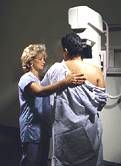
TUESDAY, Feb. 23 (HealthDay News) — In some states, access to mammograms for women ages 40 to 49 has decreased since new breast cancer screening guidelines were released in November by the U.S. Preventive Services Task Force, according to a new survey.
The task force recommended that women at average risk for breast cancer should start having mammograms every two years at age 50 instead of annual screenings starting at age 40.
The online survey of more than 150 breast cancer health educators and providers in 48 states and the District of Columbia, conducted by the Avon Foundation for Women, found that respondents from a fourth of the areas surveyed reported changes in their states’ early detection programs for breast and cervical cancer.
The respondents said that the task force guidelines and other factors, including budget cuts, have resulted in fewer women having mammograms or the elimination of early breast cancer screening programs for women younger than 50 offered through state-administered breast cancer screening programs.
California, Florida, Illinois, Michigan and New York are among the states that have made changes in their state’s breast cancer screening programs since the release of the guidelines.
The survey, conducted in early February, found that 24 percent of respondents said there’s been a decrease in the number of women younger than 50 being screened or seeking appointments for mammograms at their facilities. Many women who were already reluctant to have a mammogram are using the new guidelines to put off breast cancer screening, according to some of the respondents.
“We are concerned that some women may simply accept the new recommended guidelines as standard — not taking into consideration their own health history and other breast cancer risk factors,” Marc Hurlbert, director of the Avon Foundation Breast Cancer Crusade, said in a news release from the foundation.
All participants in the survey were Avon Foundation grant recipients.
More information
The U.S. National Cancer Institute has more about breast cancer screening.

